It has been discouraging to witness and realize the divisions among the opposition to the regimes that have ruled our homeland. The lack of unity and/or concern with personalities seem to demonstrate, aside from the many individual/single issues pursued, the absence of solid understanding that can lead to adequately pursuing and addressing the roots of the present economic and political malaise. All the current public demonstrations or rallies appear shortlived and ineffective because they are geared mainly to the ever-changing issues. There is a need to go beyond these well-intentioned but fractured street protests, and such a need demands exposing our fellow countrymen-at-large to critical analysis of themselves and their environment.
There is a need to look inward and realize some unpleasant truths about ourselves as Filipino individuals and as a society. It involves a "shaking of the foundations" or a "rocking of the boat" since it requires us to question our traditional beliefs, assumptions or notions. We need to seek an understanding of "why we are what we are, where we can or should be headed," and to therefore be able to formulate ways to attain where we can or should be. Before everything, let us remind ourselves that we Filipinos have many and known good qualities, just like people of any other country. We all know this fact. However, let us not dwell on them since the objective here is not towards self-congratulation nor to hear/read what we want to.
The task is to highlight our weaknesses so that these may in turn be corrected. I believe and think that only through a critical self-analysis or self-examination (ala preparatory to confession some of us learned in Catholic schools) can we change for the better. I am convinced that such an exercise will allow us to pursue truths however shocking and unpleasant they may be. It is only when we have "come of age," when we have come to think for ourselves as an independent people with human dignity, with our own cultural heritage, national pride and sovereignty can we act and work for our own truly, permanent liberation from the dehumanizing conditions imposed by our so-called leadership in government and business and their foreign partners.
If we are honestly concerned with our homeland beyond simply wishing for the better or fatalism, if we want fundamental changes to improve in the long-term the human conditions for the majority of our present and future countrymen in the homeland, it behooves us to do such a self-examination. We must look critically at what we are and why, examine the nature of our society which must be changed, then determine the direction of those changes. Finally, we must enlist the energies of that majority to effect such changes.
What Are We Today? Why Are We What We Are?
Jose Rizal's analysis in his pamphlet "The Indolence of the Filipino" remains valid today: "A man in the Philippines is only an individual, he is not a member of a nation." Partly due to Spanish, then American colonization and Japanese occupation plus other factors, i.e. geographical and cultural factors, but principally to the existing economic system that has inadequately provided opportunities and thus led to mass deprivation, the Filipino has withdrawn from and become indifferent to his society and isolated himself from his fellow countrymen. We have become unable to act together as a people; really unselfish cooperation is seldom possible since individualistic concerns are our preoccupation.
We are interested in what is going on in public only to the extent that these events/happenings impinge on our private lives. We Filipinos are alienated from ourselves as persons (a true human transcends purely material and physical pursuits, his purpose and interest is reconciled with those of his society, just as society's goals must ensure his welfare). Our values have been primarily those of the "economic man." We have thus measured our relations and our worth in terms of cold cash. Our goals, our happiness, our possibilities as human beings have been reduced to crude economic terms. We strive to enrich ourselves or lives "not by being much but by having much." It is self and family alone that is important. The welfare of others plays, at best, a far second in our activities. That is why the society suffers.
We live in a climate of intellectual simple-mindedness. We have developed many escapes which entertain us and at the same time prevent us from thinking of really serious matters. Many of us are too lazy to think. Many of us are afraid to think. The rest of us never learned how. We do not waste our precious leisure worrying about the problems of others or the state of society. Leisure is not seen as an opportunity for meaningful social interaction. Instead, we have the pseudo-camaraderie of numerous social clubs and civic organizations which we join not because we like other people, nor because we believe in their avowed purposes, but because membership will expose us to the limelight, will enhance our public image, will put us in contact with others who can help or be useful in our private pursuits.
We Filipinos are not Filipino enough because we are not original enough.
Mainly due to our colonial conditioning and western-type or Americanized education, we have developed an obsession for anything foreign or imported that consequently led to the lack of desire for anything Filipino (the Spanish neglect and the "free trade" imposed by the American occupation doomed any indigenous industrial development). We love to imitate ape-ishly everything. We therefore betray our colonial mentality. Caught in a vicious circle, our imitativeness is partly responsible for our failure to become truly autonomous and nationally sovereign. Just as the academian with a foreign degree is accepted without question as superior vis-a-vis a local product, so the artist who has gone abroad is ipso facto better, more artistic than the home-grown variety, in the eyes of western-oriented audiences. These so-called "cultured" Filipinos are a breed apart from the majority of Filipinos. Their thought processes are comprehensible only to themselves and their foreign friends.
We as Filipino Christians are not Christian enough.
We brag about our being the only christian country in the Asia. We brag about our crowded churches on Sundays. We brag about the length of our religious processions. We brag about the colorfulness of our barrio fiestas. We brag about the
numerical strength of our Catholic majority. But until when are we going to remain christians in name and number only? We Filipino Christians have not attained religious maturity. We are superstitious, we participate in such nonsense as the "spirit of the glass," chain letters, Good Friday penitencias, amulets, magic incantations/prayers, etc..ad nauseam.
We as Filipino Christians practice "split-level" christianity.
We have not integrated or internalized christian or humanist values in our whole being. We have not gone beyond "externalities," as happens in the Black Nazarene fame at Quiapo or the wiping of San Roque's dog. We go to church on Sundays due to compulsion, not out of conviction. We drift lazily to church, dangle and loiter at the back, walk in and walk out for a chat or smoke. We come to church because it is Sunday and we love the Sunday crowd; or if we do not like the Sunday crowd, we still go lest we be looked at differently. Our norm of moral behavior is based on the external such as shame or "hiya," "don't get caught attitude," "everyone does it," "ako ay tao lamang," and other convenient rationalizations. Because of our failure (AND the failure of the church to correctly nurture) to internalize christian ideals to become, at least partly, the basis of our actual behaviour, we as so-called christian politicians, bureaucrats or plain Juan dela Cruz feel little, if any at all, guilt upon loss of integrity. We feel neither inconsistencies nor hypocrisy.
We as Filipino Christians are intellectually unexciting Christians.
We never went beyond our small cathechism book. We never heard or read about developments in the church such as the Papal Encyclicals, Vatican II, Liberation Theology; we are unaware of the history of christianity, of the writings of Aquinas, Luther, Calvin, Teilhard de chardin, Neihbuhr, Hans Kung and other brilliant minds who wrestled with the rational aspects of our christian faith. We know nothing about the studies made about "Filipino-style" christianity by Filipino priests. We are so ignorant, thus still childish and immature in our religious beliefs and sentiments, and out of touch with what constitute a truly christian message. We therefore continue to practice an escapist religion --an opiate of the people, and an economic boon to vendors and other opportunists; and conceive of the church as limited to what happens inside the church building (these are 16th century concepts).
We Filipinos as immigrants in foreign lands are no better as persons or
members of our adopted countries.
We simply carried or brought over our individualistic, selfish aspirations. Further reinforced by a more materialistic value-system society, we more vigorously pursue purely material objectives, now more easily attained because of better opportunities. We easily forget where we came from because we never appreciated nor understood what we were or what we are as Filipinos, as a nation of people, as human beings. We do not appreciate such concepts/terms such as "human potential," "whole person," or "hierarchy of needs" because of our concentration and equation of "having, as reason for living."
We are happy every time the Philippine peso devaluates because our dollar converts for more pesos. The fact that the Filipino worker in the homeland will work the same number of hours for much less buying power or work more hours to purchase the same amount of food or clothing does not shock nor cross our minds. We look down at fellow Filipinos who have not been where we had and brag about where we had been, i.e. a cruise, etc. We suddenly consider ourselves as westernized, modern or Americanized although in fact we may have uncritically only copied the externalities of their culture or society.
We even have become prejudiced against Blacks thanks to our ignorance of Black History, with Hollywood stereotyping due to our intellectual shallowness. We do not appreciate the fact that Black activism for civil rights spinned-off our newly found opportunities. We do not register to vote because we do not see its relevance to us. Our adopted home-country offers us possibilities to grow, to appreciate what a true and complete person is, to approach the realization of our full human potential. Unfortunately, just as we were back in the homeland, we are stunted, we do not know, we do not understand what it is to be a total human being, that is, to be a member of a society. Thus, we as immigrants are no improvement to what we were before. Thus, like our fellow countrymen back home, we are still alienated from ourselves and from society.
What is the nature of Filipino society?
As a people we have been deprived for centuries of responsibility for our destiny. Under the Spaniards, this deprivation was open. They ruled we obeyed. Under the Americans, while we were ostensibly being prepared for self-government and self-reliance, we were actually being maneuvered by means of economic and political pressures to defer to American decisions at the same time that we were being conditioned by our Americanized education to prefer American ways and thinking. The result is a people habituated to abdicating control over basic areas of our national life, unaccustomed to coming to grips with reality, prone to escape to fantasies, and a parade of leadership which voluntarily chooses Americanized solutions for Philippine problems. Partly because of our intellectual conditioning and partly for personal expediency since our politicians tacitly recognize the danger of displeasing foreign "friends", especially Americans, Japanese, etc.
We simply carried or brought over our individualistic, selfish aspirations. Further reinforced by a more materialistic value-system society, we more vigorously pursue purely material objectives, now more easily attained because of better opportunities. We easily forget where we came from because we never appreciated nor understood what we were or what we are as Filipinos, as a nation of people, as human beings. We do not appreciate such concepts/terms such as "human potential," "whole person," or "hierarchy of needs" because of our concentration and equation of "having, as reason for living."
We are happy every time the Philippine peso devaluates because our dollar converts for more pesos. The fact that the Filipino worker in the homeland will work the same number of hours for much less buying power or work more hours to purchase the same amount of food or clothing does not shock nor cross our minds. We look down at fellow Filipinos who have not been where we had and brag about where we had been, i.e. a cruise, etc. We suddenly consider ourselves as westernized, modern or Americanized although in fact we may have uncritically only copied the externalities of their culture or society.
We even have become prejudiced against Blacks thanks to our ignorance of Black History, with Hollywood stereotyping due to our intellectual shallowness. We do not appreciate the fact that Black activism for civil rights spinned-off our newly found opportunities. We do not register to vote because we do not see its relevance to us. Our adopted home-country offers us possibilities to grow, to appreciate what a true and complete person is, to approach the realization of our full human potential. Unfortunately, just as we were back in the homeland, we are stunted, we do not know, we do not understand what it is to be a total human being, that is, to be a member of a society. Thus, we as immigrants are no improvement to what we were before. Thus, like our fellow countrymen back home, we are still alienated from ourselves and from society.
What is the nature of Filipino society?
As a people we have been deprived for centuries of responsibility for our destiny. Under the Spaniards, this deprivation was open. They ruled we obeyed. Under the Americans, while we were ostensibly being prepared for self-government and self-reliance, we were actually being maneuvered by means of economic and political pressures to defer to American decisions at the same time that we were being conditioned by our Americanized education to prefer American ways and thinking. The result is a people habituated to abdicating control over basic areas of our national life, unaccustomed to coming to grips with reality, prone to escape to fantasies, and a parade of leadership which voluntarily chooses Americanized solutions for Philippine problems. Partly because of our intellectual conditioning and partly for personal expediency since our politicians tacitly recognize the danger of displeasing foreign "friends", especially Americans, Japanese, etc.
Thus we have existed as a semi-ward country, with semi-independent status, our leaders busy with stop-gap measures; our people turning more towards individual pursuits for survival if not blinded by faith that promises that everything will be fine; faith divorced from reality. Objective reality in our society stares us in the face now and we are confused, lost and desperate. We managed to get by before and believed that there is nothing wrong with our society; that the difficulties are symptomatic of progress and economic growth. But all these optimistic thinking has been taught us for the last 60+ years.; and yet, the actual conditions for people especially in the countryside have not changed any better but instead gravely worsened, it is still a picture of a society burdened with harsh poverty unchanged since Rizal' s time, a century ago if not longer.
It is true that more of us are enjoying the benefits of American, Japanese, etc. gadgetry; we have more TV and stereo sets, concrete roads and buildings. But what of the increasing tribe of the unemployed and underemployed, of the millions of educated countrymen and women forced to leave the homeland for menial jobs abroad, due to successive governments' neglect, corruption and incompetence to govern for the good of the people? What of the peasants too for whom the future also holds nothing but the desperate search for food and security that occupies them today? What of the young whose talents are wasted for lack of opportunity, deficient education, malnutrition and ill-health?
And all the while a few rich, Filipinos and foreigners: local foreigners -Americans, Chinese, Koreans, etc.- have essentially taken over our economy to further enrich themselves, to avail themselves of our women, national resources and patrimony. These foreigners who do not identify nor work for the common good, except for their common good as a ruling elite/class. Their continued and ever-growing affluence assure the further degradation of the common tao. This fact has slowly lead our homeland to a society approaching that of a Latin American "banana republic" of the recent past. The only good part seems to be that as life becomes deeply unbearable, our cynicism will turn into more dissent and our indifference which hopefully will give way to an active search for real alternative approaches to our problems.
Where do we go from here?
Political freedom is meaningless unless it is based on economic freedom, for the basis of political democracy is economic democracy. Thus, our fundamental task is economic development that will provide as many Filipinos as possible their essential human needs. Mere quantitative accomplishment in roads, buildings, production, GNP statistics, etc. do not constitute development nor progress if the overall result is to make the few already rich, foreign and Filipino, richer and the Filipino majority, poorer. The true measure of economic development is found not in how rich the rich are nor even how rich the country is, but in the well-being and degree of economic security of the majority of the population.
If our aspiration is for the prosperity of the majority, then our goals must be categorized precisely as nationalist , i.e. nationalist industrialization and a modernized agriculture for the benefit of the many. These goals would seek to do away with the 60+ years of neo-colonial nature of our economy, which is the main obstacle to our national economic and political development.
However, Filipino nationalism is not a simple love of country.
It is beyond simple emotionalism, beyond the wearing of the "barong," the singing of the national anthem, of saying "I am a Filipino." It is beyond such superficialities. Anyone can say he loves his country and not even try to do something for it and its people, in whatever small way. Instead, nationalism is a point of view. Filipino nationalism is characterized by an attitude AND behaviour which insist that the power of the sovereign state must be based and exercised by Filipinos, that economic power be lodged in the Filipino people.
Since economic power is political power, it is imperative that economic decisions and control of power be wielded by native Filipinos. Since a program for true economic development through industrialization and modernized agriculture must be geared for the native Filipino, the latter should be deeply involved in such a program. A program that is planned, designed, controlled and implemented by non-Filipinos will not surely be bearing fruits for the Filipino majority.
Our Filipino nationalism will be protective within our borders, and will not deny the national interests of foreign countries in their own borders (firstly, we do not have nor will have that capability). Our Filipino nationalism will have us live in harmony with other nationalists because all nationalists can work out a plan of co-existence. Those who have carried out their nationalism beyond their borders, i.e. Japan and Nazi Germany in recent history, or the USA in post-WW2 era, were/are ultra-nationalists; more aptly, imperialists.
Filipino nationalism sees that the interests of the G7 nations, their TNCs are antagonistic to the long-term interests of underdeveloped nations such as ours. Therefore, any government politician, native Filipino businessman and/or technocrat in our homeland who support and help implement policies that only welcome and further strengthen foreign control of our economy and exploitation of our national resources/patrimony and people is not working with Filipino nationalism in their hearts and minds. In short such a Filipino is a traitor. In contrast, a nationalist government will encourage the spread of nationalist consciousness --via mass nationalist education-- among the majority of the citizenry so that it can have an effective mass support to bravely pursue nationalistic economic and political goals.
Do we need foreign TNCs ? Do we lack capital?
TNCs supposedly bring managerial talent. In reality, we have enough native managerial and professional talents to effectively and efficiently run business and manufacturing enterprises. As to capital, we should note that for decades, foreign companies have been practically hoarding out immense profits. With TNCs, our people have only experienced massive layoffs, witnessed the ruthless closing of native manufacturing facilities or buying off of such facilities, and the creation of a small, native middle class whose self-interests understandably are tied up to the foreign entities rather than indigenous growth. With mainland China becoming the "factory of the world," we saw the demise of whatever industrialization and essential agricultural production we have. What we have left are TNCs with their native partners amassing the best lands and planting for exports, for conversion to golf courses and other entertainment/sports for the wealthy and foreigners, all the while pushing more people towards impoverishment.
TNCs supposedly bring managerial talent. In reality, we have enough native managerial and professional talents to effectively and efficiently run business and manufacturing enterprises. As to capital, we should note that for decades, foreign companies have been practically hoarding out immense profits. With TNCs, our people have only experienced massive layoffs, witnessed the ruthless closing of native manufacturing facilities or buying off of such facilities, and the creation of a small, native middle class whose self-interests understandably are tied up to the foreign entities rather than indigenous growth. With mainland China becoming the "factory of the world," we saw the demise of whatever industrialization and essential agricultural production we have. What we have left are TNCs with their native partners amassing the best lands and planting for exports, for conversion to golf courses and other entertainment/sports for the wealthy and foreigners, all the while pushing more people towards impoverishment.
How do we enlist the energies of our people?
As alluded to, we need to gain mass nationalism. We need to have a strong, brave and nationalistic leadership in government and business. For us Filipinos who are seriously desiring a radical change of direction need to start with ourselves. We need to restudy and overhaul our passive, fatalistic, tradition-oriented attitudes. We need to be politicized (not limited to participation in elections, which are shams and charades for foreign consumption), but in terms of a consciousness of our right to a better life, an awareness of our power to achieve such a goal by united action, a sense of duty to participate in nation-building ultimately for the common good.
It is only through mass education for nationalism, political and social consciousness can we critically understand "what's going on" and therefrom effectively dissent and work for fundamental, radical changes in our government, business and society. It is only through the nationalist alternative that we Filipinos can regain our honor as a people and be a true nation and achieve the well-being for the majority.
-From a Filipino Patriot
DOWN
with IMPERIALISM,
CONDEMN
COMMUNISM,
UPHOLD
FILIPINISM!!!
PILIPINAS,
PARA SA PILIPINO!!!
-Batingaw ng
Bayan 2003

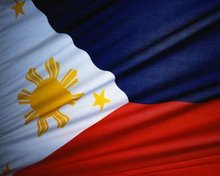



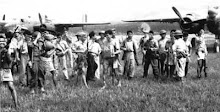
.jpg)

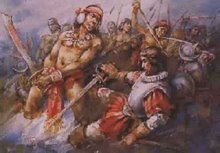
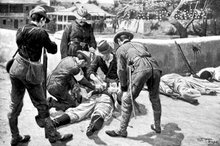
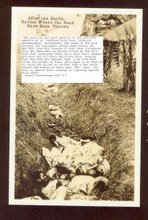
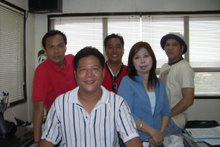
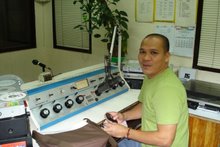


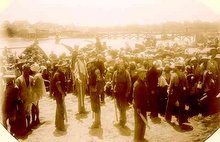
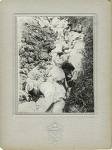
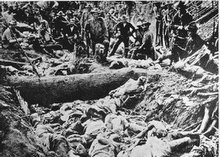
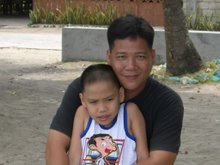

No comments:
Post a Comment